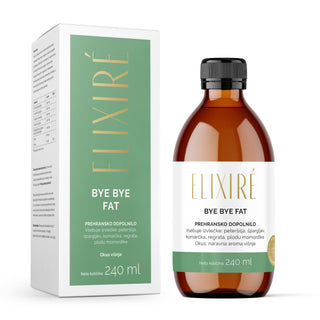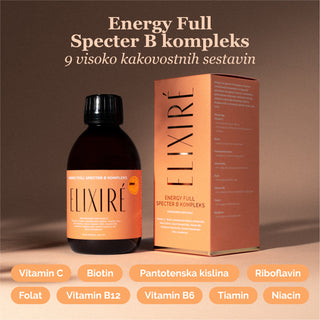Vitamin B12 is one of the most important B vitamins, essential for the formation of red blood cells, the proper functioning of the nervous system and energy metabolism. It is a vitamin that the body cannot produce on its own, so regular intake from food or nutritional supplements is essential - especially for certain groups of the population. B12 deficiency is often overlooked, but it can have a major impact on well-being, concentration and overall vitality.
What is vitamin B12 and why is it so important?
Vitamin B12 (cobalamin) is involved in many bodily functions – from the production of DNA to the formation of red blood cells and the synthesis of myelin, the substance that surrounds nerve fibers. It is important for a healthy nervous system, good energy metabolism and the reduction of fatigue. As it is a water-soluble vitamin, the body cannot store it for long, so regular intake is essential. (1*)
Groups at higher risk of deficiency
Vitamin B12 deficiency is common in:
-
Vegans and vegetarians (B12 is naturally present only in foods of animal origin), (2*)
-
Elderly (due to reduced absorption in the stomach), (3*)
-
Pregnant and lactating mothers (due to increased needs), (4*)
-
People with digestive tract disorders (celiac disease, Crohn's disease). (1*)
Because of these factors, it is important for these groups to regularly check their B12 levels and take supplements if necessary.
Allowed EFSA claims: energy, nervous system, immune function
The European Food Safety Authority (EFSA) has approved several health claims for vitamin B12:
-
Contributes to the release of energy during metabolism,
-
Contributes to the functioning of the nervous system,
-
Contributes to normal psychological functioning,
-
Contributes to reducing fatigue and exhaustion,
-
It plays a role in the functioning of the immune system,
-
It contributes to the formation of red blood cells.
These claims confirm its importance in the daily diet. (1*) (5*)
How to choose the right B12: form, dosage, absorption
Vitamin B12 is available in several forms, the most common being cyanocobalamin and methylcobalamin. The latter is the natural, biologically active form that is more accessible to the body. Liquid forms or liposomal preparations often provide better absorption than tablets, especially for people with digestive problems.
The recommended daily intake for adults is around 2.5 µg, but needs may be higher depending on age, lifestyle and health status. (5*)
Elixiré B-complex – support with high-quality B vitamins in liquid form
Elixiré Energy Full Specter B-Complex contains a full spectrum of B vitamins in liquid form, including highly bioavailable B12 (methylcobalamin). The liquid form makes it ideal for those who have digestive problems or want fast absorption. An additional advantage is the natural flavor and the absence of artificial sweeteners and colors.
View product → Elixiré B Complex | Liposomal Energy Full-Spectrum with all B vitamins
How and when to take B12 for optimal effect
It is recommended to take vitamin B12 in the morning or early afternoon as it supports energy metabolism.The daily dose can be adjusted to individual needs - for greater needs, it is recommended to take supplements with higher doses. In liquid forms, it can be consumed directly or diluted in water.
Literature: (*)
- Source: Vitamin B12 in health and disease, (F. O'Leary 1, S. Samman), https://pubmed.ncbi.nlm.nih.gov/22254022/
- Source: The prevalence of cobalamin deficiency among vegetarians assessed by serum vitamin B12: a review of literature, (R. Pawlak, SE Lester, T. Babatunde), https://pubmed.ncbi.nlm.nih.gov/24667752/
- Source: Andres E, Loukili NH, Noel E, et al. Vitamin B12 (cobalamin) deficiency in elderly patients, (E. Andrès, N. Henoun Loukili., E. Noel, G. Kaltenbach, M. Ben Abdelgheni, A. Elisabeth Perrin, M. Noblet-Dick, F. Maloisel, JL Schlienger, JF Blicklé), https://pubmed.ncbi.nlm.nih.gov/15289425/
- Source: Long-term ovo-lacto vegetarian diet impairs vitamin B-12 status in pregnant women, (C. Koebnick, I. Hoffmann, PC Dagnelie, UA Heins, SN Wickramasinghe, ID Ratnayaka, S. Gruendel, J. Lindemans, C. Leitzmann), https://pubmed.ncbi.nlm.nih.gov/15570032/
- Source: Causes of vitamin B12 and folate deficiency, (L.H. Allen), https://pubmed.ncbi.nlm.nih.gov/18709879/








